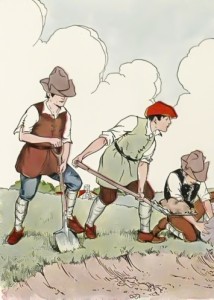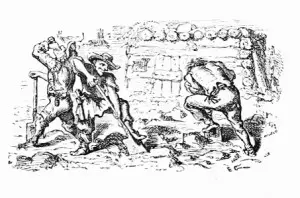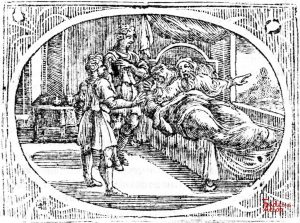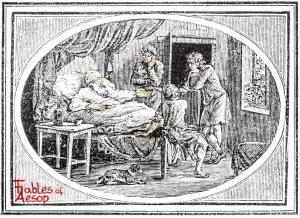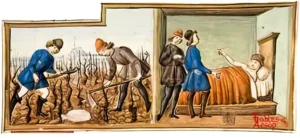A dying father told his sons about a treasure in a field if they only dig for it. They did. Good yield was their treasure.
Good counsel is the best legacy.
A dying Father called his Sons to his bedside in order to give counsel. He said: “There is a great treasure hidden in one of the vineyards.” Shortly after that he died. The Sons, upon his death, took up implements and carefully dug over every part of the land. They found no material treasure, but the vines yielded an extraordinary crop because of the care.

Aesop For Children
A rich old farmer, who felt that he had not many more days to live, called his sons to his bedside.
“My sons,” he said, “heed what I have to say to you. Do not on any account part with the estate that has belonged to our family for so many generations. Somewhere on it is hidden a rich treasure. I do not know the exact spot, but it is there, and you will surely find it. Spare no energy and leave no spot unturned in your search.”
The father died, and no sooner was he in his grave than the sons set to work digging with all their might, turning up every foot of ground with their spades, and going over the whole farm two or three times.
No hidden gold did they find; but at harvest time when they had settled their accounts and had pocketed a rich profit far greater than that of any of their neighbors, they understood that the treasure their father had told them about was the wealth of a bountiful crop, and that in their industry had they found the treasure.
Moral
Industry is itself a treasure.

JBR Collection
A certain Husbandman, lying at the point of death, called his Sons around him, and gave into their charge his fields and vineyards, telling them that a treasure lay hidden somewhere in them, within a foot from the ground. His Sons thought he spoke of money which he had hidden, and after he was buried, they dug most industriously all over the estate, but found nothing. The soil being so well loosened, however, the succeeding crops were of unequalled richness, and the Sons then found out what their Father had in view in telling them to dig for hidden treasure.

Townsend version
A Father, being on the point of death, wished to be sure that his sons would give the same attention to his farm as he himself had given it. He called them to his bedside and said, “My Sons, there is a great treasure hid in one of my vineyards.” The Sons, after his death, took their spades and mattocks and carefully dug over every portion of their land. They found no treasure, but the vines repaid their labor by an extraordinary and superabundant crop.

Samuel Croxall (The Husbandman and his Sons)
A CERTAIN Husbandman lying at the point of death, and being desirous his Sons should pursue that innocent, entertaining course of agriculture, in which himself had been engaged all his life, made use of this expedient to induce them to it. He called them to his bed-side, and spoke to this effect. All the patrimony I have to bequeath to you, Sons, is my farm and my vineyard, of which I make you joint-heirs. But I charge you not to let it go out of your own occupation: for, if I have any treasure besides, it lies buried somewhere in the ground, within a foot of the surface. This made the Sons conclude, that he talked of money which he had hid there: so, after their father’s death, with unwearied diligence and application, they carefully dug up every inch, both of the farm and vineyard. From which it came to pass that though they missed of the treasure which they expected, the ground, by being so well stirred and loosened, produced so plentiful a crop of all that was sowed in it, as proved a real, and that no inconsiderable treasure.
THE APPLICATION
Labour and industry, well applied, seldom fail of finding a treasure; and since something towards the conveniences and pleasures of life may be thus procured, why should we lose and throw it away, by being slothful and idle? Exercise is a great support of health, and health is by far the greatest single blessing of life; which alone will weigh sufficient with any considerate man; so as to keep him from being utterly destitute of employment. But of all kinds of treasure which are sure to reward the diligence of the active man, none is more agreeable, either in the pursuit or possession, than that which arises from the culture of the earth. What can be more satisfactory, than to have our hopes grow and increase everyday with the product of the ground; to have our minds entertained with the wonderful economy of the vegetable world; our nerves strengthened, and our blood purified, by a constant return of exercise; and a new relish given to every meal from the fragrance of the air, and freshness of the soil; add to all these, that the treasures and delights of agriculture are so various, that they are not easily to be described, and are never to be excelled. They are scarce to be conceived by one that has not felt them, nor to be truly painted by any but the greatest of poets.

Thomas Bewick (The Husbandman and His Sons)
A Husbandman, at the point of death, being desirous that his Sons should pursue the same innocent course of agriculture in which he himself had been engaged all his life, made use of this expedient. He called them to his bed-side, and said: All the patrimony I have to bequeath to you, my sons, is my farm and my vine-yard, of which I make you joint heirs; but I charge you not to let them go out of your own occupation, for if I have any treasure besides, it lies buried somewhere in the ground within a foot of the surface. This made the Sons conclude that he talked of money which he had hidden: so after their father’s death, with unwearied diligence, they carefully dug up every inch, and though they found not the money they expected, the ground, by being well stirred and loosened, produced so plentiful a crop of all that was sown in it, as proved a real, and that no inconsiderable treasure.
APPLICATION
The good name and the good counsel of a father, are the best legacies he can leave to his children; and they ought to revere the one, and keep in mind the other. The wealth which a man acquires by his honest industry affords him greater pleasure in the enjoyment, than when acquired in any other way; and men who by personal labour have obtained a competency, know its value better than those can who have had it showered upon them without any efforts of their own. Idleness engenders disease, while exercise is the great prop of health, and health is the greatest blessing of life, which consideration alone ought to stimulate men to pursue some useful employment; and among the almost endless number of those, to which good laws and well-organized society give birth and encouragement, there are none equal to the culture of the earth, none which yield a more grateful return. The pleasures derived both from agriculture and horticulture, are so various, so delightful, and so natural to man, that they are not easily to be described, and are never to be excelled: for in whatever way they are pursued, the mind may be constantly entertained with the wonderful economy of the vegetable world; and the nerves are invigorated and kept in proper tone by the freshness of the earth, and the fragrancy of the air, which blush the countenance with health, and give a relish to every meal.

L’Estrange version
A countryman that liv’d handsomly in the world himself upon his honest labour and industry, was desirous his sons should do so after him; and being now upon his death-bed: My dear children (says he) I reckon my self bound to tell you before I depart, that there is a considerable treasure hid in my vineyard. Wherefore pray be sure to dig, and search narrowly for’t when I am gone. The father dyes, and the sons fall immediately to work upon the vineyard. They turn’d it up over and over, and not one penny of mony to be found there; but the profit of the next vintage expounded the riddle.
Moral
Good councell is the best legacy a father can leave to a child, and it is still the better, when it is so wrapt up, as to beget a curiosity as well as an inclination to follow it.

Crane Poetry Visual
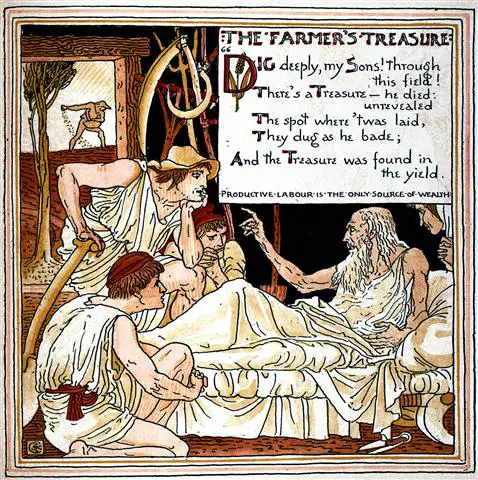
“Dig deeply, my Sons! through this field!
There’s a Treasure … he died unrevealed
The spot where ’twas laid,
They dug as he bade;
And the Treasure was found in the yield.
Productive labour is the only source of wealth.

Gherardo Image from 1480

Pater, Filius, et Agrorum Cultura
Rusticus, mortem suam exspectans, cum relinquere filiis suis divitias non posset, animos eorum ad studium diligentis agrorum culturae et ad laboris assiduitatem excitare voluit. Arcessit igitur eos ad se atque ita alloquitur, “Mei filii, quomodo res meae se habeant, videtis. Quidquid autem per omnem vitam reservavi; hoc in vinea nostra quaerere poteritis.” Haec cum dixisset, paulo post moritur senex. Filii, patrem in vinea alicubi thesaurum abscondisse arbitrantes, arreptis ligonibus universum vineae solum effodiunt. Thesaurum quidem nullum inveniunt; terram vero fodiendo adeo fertilem reddiderunt, ut vites uberrimum fructum ferrent.

de La Fontaine (Le Vieillard et les trois jeunes Hommes)
Un octogénaire plantoit.
Passe encor de bâtir; mais planter à cet âge!
Disoient trois jouvenceaux, enfants du voisinage:
Assurément il radotoit.
Car, au nom des dieux, je vous prie,
Quel fruit de ce labeur pouvez-vous recueillir?
Autant qu’un patriarche il vous faudroit vieillir.
A quoi bon charger votre vie
Des soins d’un avenir qui n’est pas fait pour vous?
Ne songez désormais qu’à vos erreurs passées:
Quittez le long espoir et les vastes pensées;
Tout cela ne convíent qu’à nous.
Il ne convient pas à vous-mêmes,
Repartit le vieillard. Tout établissement
Vient tard, et dure peu. La main des Parques blêmes
De vos jours et des miens se joue également.
Nos termes sont pareils par leur courte durée.
Qui de nous des clartés de la voûte azurée
Doit jouir le dernier? Est-il aucun moment
Qui vous puisse assurer d’un second seulement?
Mes arrière-neveux me devront cet ombrage:
Hé bien! défendez-vous au sage
De se donner des soins pour le plaisir d’autrui?
Cela même est un fruit que je goûre aujourd’hui:
J’en puis jouir demain, et quelques jours encore;
Je puis enfin compter l’aurore
Plus d’une fois sur vos tombeaux:
Le vieillard eut raison: l’un des trois jouvenceaux
Se noya dès le port, allant à l’Amérique;
L’autre, afin de monter aux grandes dignités,
Dans les emplois de Mars servant la république,
Par un coup imprévu vit ses jours emportés;
Le troisième tomba d’un arbre
Que lui-même il voulut enter:
Et pleurés du vieillard, il grava sur leur marbre
Ce que je viens de raconter.
Perry #042
